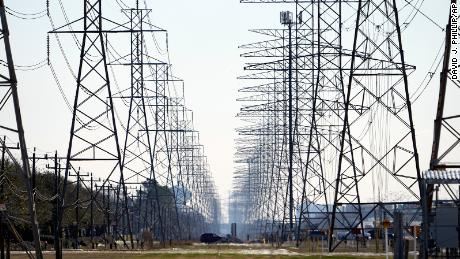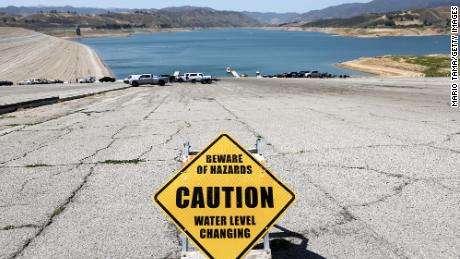Energy secretary: Biden 'obsessed' with lowering 'outrageous' gas prices

New York (CNN Business)The world is grappling with gravity-defying energy price spikes on everything from gasoline and natural gas to coal. Some fear this may just be the beginning.
Current and former energy officials tell CNN they worry that Russia’s invasion of Ukraine in the wake of years of underinvestment in the energy sector have sent the world careening into a crisis that will rival or even exceed the oil crises of the 1970s and early 1980s.
Unlike those infamous episodes, this one is not contained to oil.
“Now we have an oil crisis, a gas crisis and an electricity crisis at the same time,” Fatih Birol, head of the International Energy Agency watchdog group, told Der Spiegel in an interview published this week. “This energy crisis is much bigger than the oil crises of the 1970s and 1980s. And it will probably last longer.”
The global economy has largely been able to withstand surging energy prices so far. But prices could continue to rise to unsustainable levels as Europe attempts to wean itself off Russian oil and, potentially, gas. Supply shortages could lead to some difficult choices in Europe, including rationing.
Joe McMonigle, secretary general of the International Energy Forum, said he agrees with this depressing forecast from the IEA.
“We have a serious problem around the world that I think policymakers are just waking up to. It’s kind of a perfect storm,” McMonigle, whose group serves as a go-between for energy producing and consuming nations, told CNN in a phone interview.
The extent of that perfect storm — underinvestment, strong demand and supply disruptions from the war — will have wide-reaching consequences, potentially threatening the economic recovery from Covid-19, exacerbating inflation, fueling social unrest and undermining efforts to save the planet from global warming.
Birol warned of supply bottlenecks of gasoline and diesel, especially in Europe, as well as rationing of natural gas next winter in Europe.
“It is a crisis for which the world is woefully unprepared,” said Robert McNally, who served as a top energy adviser to former US President George W. Bush.
Not only are energy prices very high, but the reliability of the power grid is being challenged by extreme temperatures and severe drought. A US power grid regulator warned last month that parts of the country could face electricity shortages and even blackouts this summer.
‘Our fears have borne out’
Former Obama energy adviser Jason Bordoff and Harvard University professor Meghan O’Sullivan wrote a piece in the Economist in late March warning that the world was on the cusp of “what may become the worst energy crisis since the 1970s.”
“Since we wrote that, our fears have borne out,” Bordoff, co-founding dean of the Columbia Climate School, told CNN.
Of course, there are key differences between today and the 1970s. Prices have not spiked nearly as much as they did then and policymakers have not resorted to extreme steps like price controls.
“Were we to resort to price controls and price caps, then we could have shortages,” McNally said.
When the war started, the West sought to avoid targeting Russia’s energy supplies directly because it was simply too critical to global markets. Russia is not just the world’s largest oil exporter, but it is the biggest natural gas exporter and a major supplier of coal.
But as the brutality of the war became clear to the world, that hands-off approach did not last, with the United States and other countries banning Russian energy imports.
Russia retaliated against Western sanctions by restricting or even halting its shipment of natural gas to multiple European countries.
The European Union announced plans this week to phase out 90% of Russian oil imports by the end of the year. That move has raised the specter of further retaliation from Russia.
This tit-for-tat situation has only worsened the supply shortfall in energy markets that were already tight.
“We have not yet seen how bad this energy crisis is going to get,” Bordoff said.
Already, US gasoline prices have surged by 52% over the past year to record highs, angering the public and contributing to the nation’s inflation crisis.
Prices for natural gas, a vital fuel for heating homes and powering the electric grid, have nearly tripled over the past year in the United States. Natural gas prices have skyrocketed even further in Europe, though they are well off their worst levels.
‘Putin just brought us there faster’
Today’s energy turmoil is not simply the result of the war in Ukraine. It is also the byproduct of cratering investment in oil and natural gas, which are depleting resources that require massive sums of money just to maintain their production, let alone increase it.
Upstream investment in the oil and gas sector stood at just $341 billion in 2021, 23% below the pre-Covid level of $525 billion and well below the recent peak in 2014 of $700 billion, according to the IEF.
This investment shortfall has been brought on by a series of factors, including a push among investors and governments to bet on clean energy, the uncertain future of fossil fuels and years of weak and volatile oil prices.
“Because of the desire to bring down carbon emissions, we have a lot less appetite to invest in hydrocarbons. And that exacerbates the price volatility and makes it more difficult to resolve the supply side,” said Francisco Blanch, head of global commodities at Bank of America.
Europe was already grappling with an energy crisis last year and prices for natural gas, coal and oil were high long before the first Russian tanks began rolling into Ukraine.
“We were heading towards a crisis anyway. Putin just brought us there faster and sharper,” said McNally, who is now the president of consulting firm Rapidan Energy Group.
Shortages and gas lines?
The 1973 oil crisis was marked by hours-long lines at gas stations, fuel shortages and panic.
Experts said they worry about fuel shortages again today, although they view that as a greater risk in Europe than in the United States.
“Fuel shortages are a global problem. You’re going to see that very soon, though maybe not in the US,” said Bank of America’s Blanch.
Blanch said he thinks this risk is lower in the United States because the country remains one of the biggest oil producers on the planet and is a major exporter of energy. Europe, on the other hand, is more reliant on foreign oil and natural gas — especially from Russia.
The IEA chief warned of natural gas rationing in Europe, which is heavily dependent on Russia for gas.
Blanch noted that sky-high natural gas prices have already shut down factories in Europe.
“Europe is already in natural gas rationing mode,” he said.
‘We have to be careful here’
Energy experts told CNN they worry global policymakers are mismanaging the climate crisis, focusing too much on reducing supply and not enough on cutting the world’s appetite for fossil fuels.
“We’re not doing nearly enough to reduce hydrocarbon demand consistent with our climate goals,” said Bordoff.
Focusing on just one side of the equation risks not only price spikes but social unrest and turning the public off to climate action.
“We have to be careful here because if we allow the public to equate high energy prices with the energy transition, we’re doomed,” said McMonigle. “You will essentially lose public support, probably permanently.”
McMonigle urged governments to send signals to investors that not only is it okay to still invest in fossil fuels, but it’s “necessary” for the world economy and progress in the energy transition.
But even if policymakers convince investors to ramp up investment, that would take considerable time to result in more supply.
What could end the energy crisis
Of course, no one can say with certainty exactly how all of this will play out. And there could be surprises that ease the supply crunch.
For instance, a diplomatic breakthrough that ends the war in Ukraine and allows sanctions to get lifted from Russia would be a gamechanger.
Birol said other surprises that would ease the energy crisis include an Iranian nuclear deal, a deeper economic slowdown in China or an agreement by Saudi Arabia and other OPEC producers to ramp up oil production.
He also reiterated that governments stand ready to release further emergency stockpiles of oil. However, even the record-setting release of US emergency stockpiles had just a modest and fleeting impact on gasoline prices.
In March, the IEA also urged governments around the world to consider drastic steps to slash oil demand, including reducing speed limits on highways, working from home up to three days a week where possible and car-free Sundays in cities.
And there’s at least one other development that has been front-and-center lately and would ease the energy crisis: An economic recession, or at least one that’s deep enough to cause demand to collapse.
Source: Read Full Article




